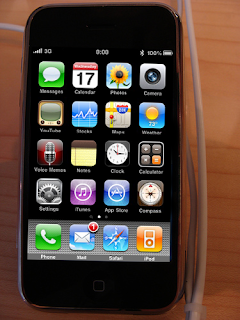 Yes, I got an iPhone. After playing around with it for a few days, I started looking at medical applications and realized smartphones are a really powerful technology. In the last two years, I carried around a pharmacopoeia, antibiotic resistance chart, pocket manuals, and other assorted paraphernalia. But with a smartphone loaded with applications and access to the Internet, much of that becomes unnecessary.
Yes, I got an iPhone. After playing around with it for a few days, I started looking at medical applications and realized smartphones are a really powerful technology. In the last two years, I carried around a pharmacopoeia, antibiotic resistance chart, pocket manuals, and other assorted paraphernalia. But with a smartphone loaded with applications and access to the Internet, much of that becomes unnecessary.I think many in the medical community (especially older practitioners) are "late adopters" - that is, they don't try new technologies until they've matured. And indeed, the iPhone is by no means "new." But I think there's a good deal of potential to unlock with smartphones. For example, what if laboratory results could be "pushed" to the iPhone? On the one hand, physicians would receive results much faster (rather than hunting for a computer and constantly refreshing to see when new results are up or calling the lab repeatedly). On the other hand, how does that fit with patient privacy laws? In the same way, can the iPhone be used to take a picture of a patient's rash and then forward it to a dermatologist? Or would that be an imprudent use of technology? How about an application that identifies pills taken by the iPhone's camera? When patients come in with unmarked pill bottles, we could figure out what they are. One can even imagine more extreme cases; perhaps smartphones may be able to listen to patient's hearts and determine the rhythm or be used to send in prescriptions.
I think with emerging technologies, we need to be aware of the ethical implications and risks. But there's an untapped potential to improve patient outcomes through efficiency, accuracy, and decision support.
Image shown under Creative Commons Attribution 3.0 License, from Wikipedia.



No comments:
Post a Comment